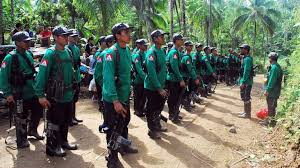
Manila: Hopes of finally achieving peace with insurgents appear brighter than it had ever been as the unilateral ceasefire declared by both sides in the Philippines appear to be holding, officials said.
Government (GRP) chief negotiator and concurrent Labour Secretary Silvestre Bello III said that a month after the government and insurgents under the National Democratic Front, Communist Party of the Philippines and the New People’s Army (NDF-CPP-NPA) umbrella had agreed to resume peace negotiations, the unilateral truce appears to be holding with no reports of major clashes and incidents since August 21.
“It is indicative of the sincerity of both parties in the peace) process which augurs well for peace,” Bello said.
A unilateral ceasefire is different from a conventional temporary cessation of hostilities in the sense that it is the parties involved that ordered its own forces not to engage the opposing force without the benefit of a formal ceasefire or truce declaration.
The individual suspension of military operation is aimed at proving either party’s sincerity to enter into negotiations that ultimately end hostilities.
President Rodrigo Duterte restored a unilateral and indefinite ceasefire on the eve of the formal resumption of peace talks with the NDF on August 21 to create a climate conducive for negotiations. To reciprocate this gesture, the NDF extended a seven-day suspension of military operations unilaterally declared on August 21-27.
The NDF likewise declared its own unilateral and indefinite ceasefire when the first round of talks in Oslo ended on August 26.
Bello credits the absence of hostilities to the sincerity and willingness of the government and the NDF-CPP-NPA to put a negotiated settlement to the 47-year-old communist insurgency.
“This indefinite unilateral ceasefire from the NPA is considered historic and unprecedented,” said Bello.
In the past, similar unilateral truce declarations were ordered by either side, but most of this was aimed at getting propaganda mileage. During Christmas and New Year, similar declarations on temporary halt in hostilities are ordered, but such gestures are mainly aimed at giving a break to soldiers and rebel combatants from the fighting and to be with their families during the holidays.
In addition to observing a truce, the government also ordered the release of 22 “consultants” of the NDF who were previously arrested and are facing criminal charges.
“In the 30-year history of government peace negotiations with the CPP/NPA/NDF, the talks have been disrupted for at least 15 times. The breakdown in the talks was mainly due to two issues: the release of detained NDF consultants and declaration of ceasefire. With both issues addressed, the formal resumption of peace talks on August 22-28 in Oslo was made possible,” said Bello.
Substantive phase
The peace talks are entering the more substantive phase of parleys with both parties submitting outlines and drafts on social and economic reforms and political and constitutional reforms in the next round.
Both parties will also take up a proposed amnesty proclamation for all listed detained NDF members.
Aside from this, negotiators are also expected to tackle a vital element in the parleys — the cessation of hostilities and disposition of forces.
These two issues will also be tackled when the peace talks resumes in Oslo, Norway on October 6-10 for the second round of negotiations.
The insurgency has killed more than 150,000 civilians as well as combatants and had left large parts of the country under developed, especially in the rural, remote areas.











